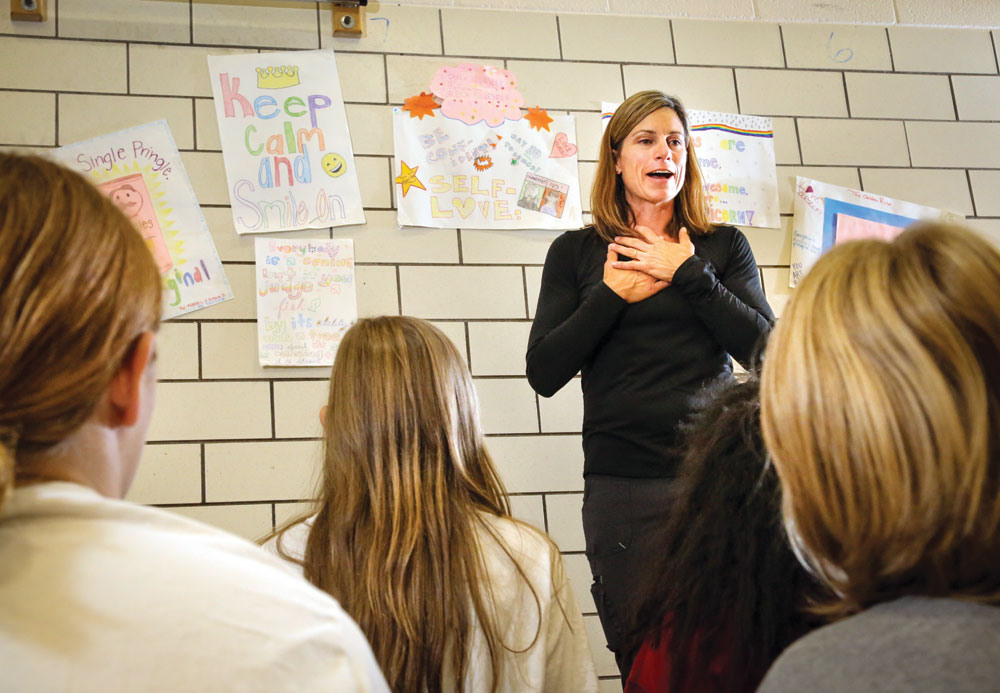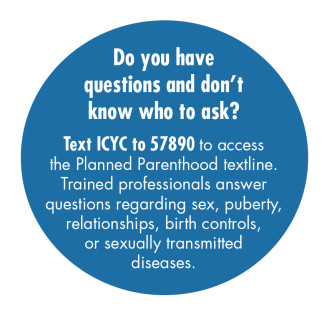
Reproductive health teacher at McAuliffe Kendra Collings teaches a class to seventh-grade girls.
We watched a disturbing video of giving birth.
The teacher showed vivid STD pictures of real, infected people.
It was kind of a joke and had no depth to it. My teacher brought in a walrus penis bone.
We watched a horrific video of how and why you get your period. We didn’t talk about sex.
We talked about how babies are made, but never actually discussed sex or how to protect yourself.
 These are memories collected from people about their sex education experience in school. Most schools, if they do offer sex education, focus on the nuts and bolts of the female and male anatomies and how babies are born. But McAuliffe International School in Park Hill is taking a more comprehensive approach to sex and sexuality by focusing on life goals and what it means to be a good partner.
These are memories collected from people about their sex education experience in school. Most schools, if they do offer sex education, focus on the nuts and bolts of the female and male anatomies and how babies are born. But McAuliffe International School in Park Hill is taking a more comprehensive approach to sex and sexuality by focusing on life goals and what it means to be a good partner.
Kendra Collings is a seventh-grade reproductive health and physical education teacher. She uses the HealthTeacher curriculum, an online resource of health education tools including lessons, interactive presentations and additional resources to integrate health into any classroom and make sure kids live well.
“Kids are curious, just like we were growing up, and if we don’t teach them this stuff, somebody else will, and that resource may not be in our child’s best interest, or it may just be very inaccurate,” she says.
As the child and grandchild of teen parents, Collings has felt the impact when sex education is not taught. Her mom, who had a full-ride scholarship, could not go to college. Her parents are still together and managed to move from supreme poverty to middle class, but it was extremely difficult.
Collings has a master’s in health education and a master’s in physical education. She has two children who both go to McAuliffe. When they’re older they’ll tell everyone how their mom taught the whole school about sex.
As part of the reproductive health class, every month the students focus on one skill they can use to be a better person. In the active listening unit, they practice listening without interrupting and while making continuous eye contact. In the assertiveness unit, they learn how to effectively use their words to be heard. For example, when someone is upset, instead of saying “You did this …” the students learn to say, “I feel this way because ….” They use these same skills when discussing what it means to be a good partner in a relationship.
In the sex and sexual health part of the class, the boys and girls are separated and the doors are locked to avoid interruptions. Collings begins by discussing goals and asks the students what they want out of life. They discuss together how to make those goals happen and if they had a baby, would that goal still be possible? “It teaches them that if they really want this thing for themselves, they need to take care of their bodies,” Collings says.
The next part of the class is dedicated to questions. The students can write them anonymously and put them into a box. Collings somehow makes what’s normally a blush-inducing experience, into a positive, even humorous experience. “You have to be direct but not uncomfortably direct. I don’t know how I do it,” she says and laughs.
 Does kissing get you pregnant? No, kissing does not get you pregnant.
Does kissing get you pregnant? No, kissing does not get you pregnant.
Can you get pregnant from oral sex? Well, what do you know about oral sex? How did you hear that word? No, you cannot get pregnant from oral sex because the reproductive and digestive tracts are separate. It can’t jump from one to the other.
Is it OK if I am attracted to another girl? Of course it is. Now what you need to do within your own family unit is your own journey because it’s still considered very different in some families, but in other families, it’s just normal, as long as you love somebody.
At times, Collings shares her opinion as a mom and makes it very clear to students it is what she would want for her kids.
Because the class sparks curiosity, the final part goes over reliable resources and using websites with .edu or .org to answer questions.
In addition, Planned Parenthood of the Rocky Mountains visited the class to host an educational workshop after a McAuliffe parent attended their Open Minds, Family Talks. See sidebar.
This information is essential to kids’ well being because many are not getting sex education at home, according to Collings. Within her own friend circle of moms, many don’t want to teach their kids about sex but want it to be taught in school. “We are totally missing a big gap in not only health education in Colorado, but education about alcohol, tobacco, marijuana, Internet safety and emotional safety. My goal is to make sure every boy and girl at this school has a resource for their questions.”



0 Comments